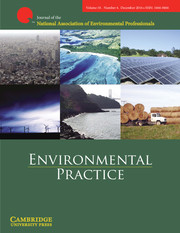I read the article “In Search of Common Ground: Exploring Identity and Core Competencies for Interdisciplinary Environmental Programs” in Environmental Practice volume 12, number 1 (March 2010), and appreciate the efforts of the authors and the National Council for Science and the Environment (NCSE) on this issue. As a graduate of interdisciplinary programs in Environmental Science (BS/MS) 15 years ago, I wanted to note that another parameter, not mentioned in the article, that I believe increasingly affects the ability of environmental professionals from interdisciplinary academic programs such as environmental science to succeed in their professions is occupational licensing. Certifications are nice but generally make little difference in comparison to state-issued licenses required for certain types of environmental work that are limited to individuals from specific academic backgrounds. For example, as a result of professional licensing laws, an environmental scientist can no longer submit an environmental site investigation report in Texas (and many other states); only a geologist can. This translates into professional and business opportunities for the licensed group that may ultimately affect the viability of interdisciplinary environmental programs in our universities. Hopefully the efforts of the Council of Environmental Deans and Directors (CEDD) and those of the NCSE discussed in the article and the National Association of Environmental Professionals (NAEP) can make an impact on this issue.
No CrossRef data available.




